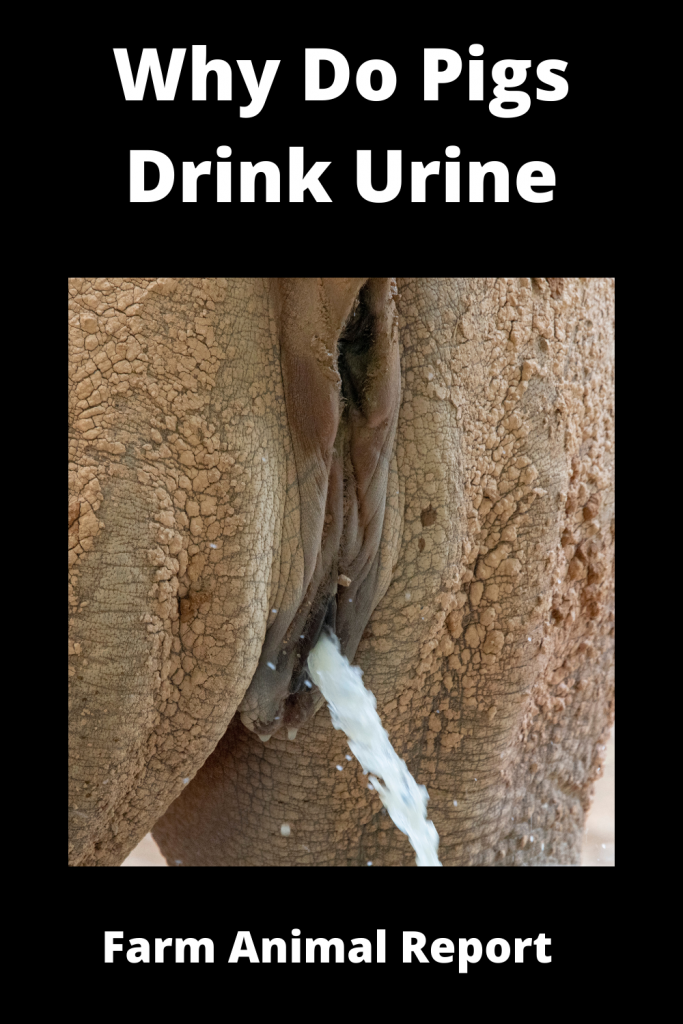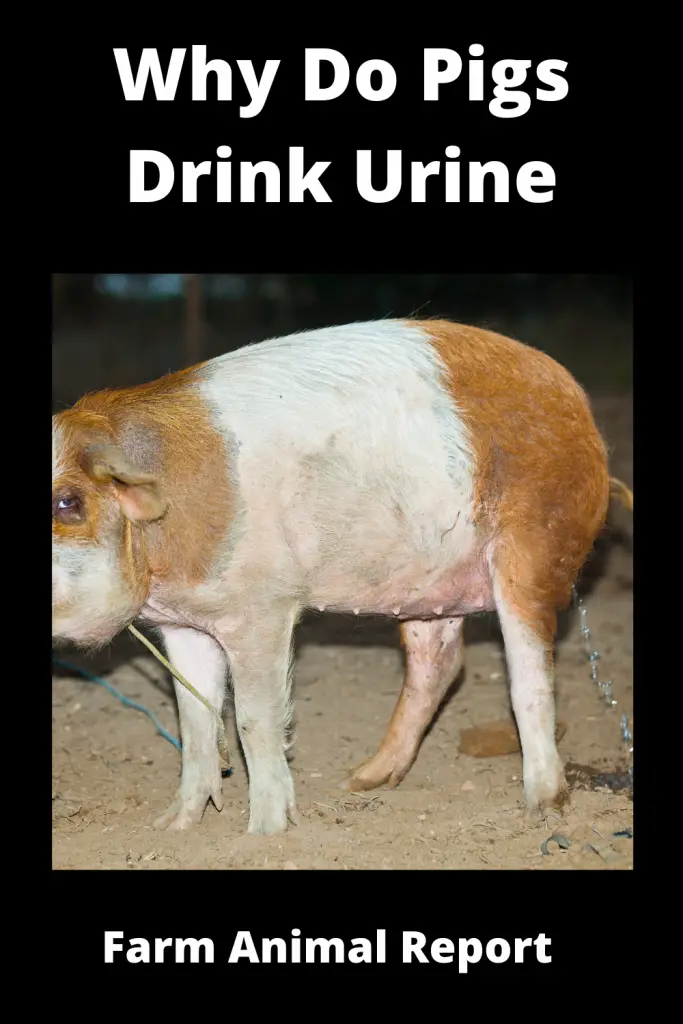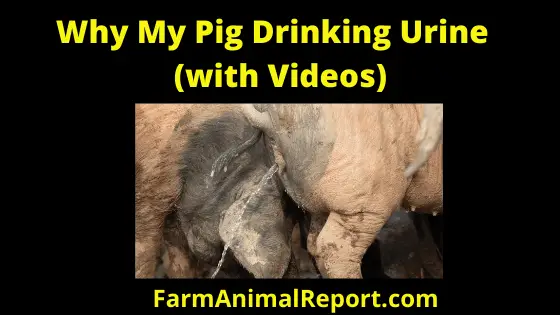Why Do Pigs Drink Urine
Why Do Pigs Drink Urine – Pigs like to excrete in cool and wet areas and lie in warm and dry areas. Pigs often drink, urinate, and defecate in close proximity to each other. Because pigs take an unstable stance when they are excreting, they tend to excrete in a place that is away from the commotion, and most commonly in a corner or against a wall. In most pens, the majority of the commotion is near the feeding areas so pigs tend to excrete away from feeders.
If water is spilled, the pigs lie away from that area and then use it as an excretory area.
See Amazons Educational Resources for Raising Pigs
So, pigs usually create the dunging area near drinkers.
Pigs also like to excrete along with the opening partitions between pens due to either drafts or the natural marking behavior when they see other pigs in the next pen. Both higher room temperatures and a higher stocking density can cause pigs to foul the pen.
See Amazons Educational Resources for Raising Pigs
No Access to Fresh Water
Sometimes pigs drink their urine because your pig doesn’t have access to freshwater and urine is better than nothing. However, if your pig has fresh water available, there may be other issues causing your pig to seek out urine.
In a study, a 180-sow unit was observed having abnormal behavior of wall licking, urine drinking, belly-nosing, penis sucking, and ear-biting at the base of the ear in weaned pigs from seven to 10 weeks old and in finishing pigs.
See Our Extensive Guide – 13 Ways to Make Money Pig Farming
Feed intake, growth rate, and feed conversion were affected. An investigation was carried out involving clinical examination, laboratory, and nutritional investigations.

Low Salt – Mineral Deficiency
A diagnosis of vice (abnormal behavior) with a possible nutritional link due to low salt (NaCl) in the diet was made based on these investigations. A control programmed consisting of re-formulation of the weaner and finisher diets for salt was implemented.
This resulted in the correction of this abnormal behavior in the weaners and finishers. No further cases of this abnormal behavior have occurred since. So, a mineral deficiency is one reason why this may be happening. If there is an intact pig versus an unaltered pig, this is another reason why a pig might drink the urine of another pig.
If your pig is drinking the urine of a different species of animal, such as a dog, there may be underlying reasons why this is occurring as well.
Water Requirements for Pigs
Water accounts for as much as 80% of body weight at birth and declines to approximately 50% in a finished market pig. Water requirements are primarily associated with body weight and feed intake.
Suckling piglets drink around 1.5 oz of water per day on the first days after birth and gradually increase consumption to around 1.5 cups daily by weaning at 28 days.
Water intake during the nursing period may prevent dehydration and promote the survival of piglets with low milk intake. After weaning, water requirements are highly variable. In general, water requirements are commonly based on water to feed ratios, with normal ratios of 2:1 to 3:1 for nursery and grow-finish pigs, declining as pigs grow
. In gestation, restricted-fed sows consume most of the water between meals and there is no relation between water and feed intake. Water requirements for gestating sows range from 3 to 6 gallons of water per day. In lactation, sows have the greatest water requirement attributed to meeting the demands of milk production. Also, water consumption is important to encourage feed consumption in lactation.
Water requirements for lactating sows range from 5 to 10 gallons per day.
Coprophagy is the eating of feces. While the behavior is normal for the young of most species, probably to help them establish intestinal flora, and for the dams of young of some species, to keep the nest area clean,
it can occur for less desirable reasons. In some cases, the behavior is associated with an animal kept in a barren environment, thus resembling a behavior of ‘boredom.’ Coprophagy has also been seen as the result of various medical conditions. These include exocrine pancreatic insufficiency, hydrocephalus, and high parasite burdens.
Eating the feces of another species is commonly done by dogs. Cat feces is high in protein and the smell/taste seems to attract dogs. Horse feces has predigested vegetable matter and attract some dogs in the same way that regular grass does. In this case, however, the pre-digestion by the horse’s gastrointestinal system allows the vegetable matter to be processed in the dog since the cellulose bonds have already been broken.
Why Does My Pig Eat Poop?
This is especially concerning if the litter is involved. Pigs will eat the litter especially the litter that has a nice fragrance. So, no clay clumping type litter and no cedar chips. The urine mixed with the cedar causes a gas to form which can cause serious respiratory problems.
Also, pigs have been known to eat dog, cat, and even their own poop. Although gross, poop eating is a natural (although disgusting) habit of most omnivores and carnivores. Vitamins, fats, and other foodstuffs are passed in the stool. In addition, beneficial bacterial cultures can be found in stool.
So, it’s not really a huge concern, but NO kissing your pig until he gives up this habit.
2 Types of Pig Poop
Pigs have two types of feces. One of them is the hard, solid, almost black that you see around the cage.
What Are Pig Cecotropes
Then, the other type is the pig cecotropes or the soft poop that kind of sticks together. This type is much brighter, almost yellowish. Cecotropes are small, soft feces that pigs produced in the night or early morning. They are also called” night feces” or” soft feces”.
Cecotropes are very important for pig nutrition because they contain some essential nutrients and vitamins, like vitamin B and vitamin K. The pigs will eat cecotropes from 100 to 200 times a day and you will see these feces rarely because pigs usually eat them directly from their bottoms (anus).
We need to remember that cecotropes are very good for pig’s health and that these feces can contain a lot of good bacteria that are beneficial for the pig’s digestive system.
Benefits of Pigs Eating Poop
The soft stool is the one that pigs consume and the one that you will almost never see in the cage. This stool is beneficial for them because it helps them digest foods better and absorb more nutrients from the foods they eat. Their poop contains a lot of vitamin K and vitamin B-complex.
Also, these feces provide them with some proteins too. In fact, their soft poop has a lot of protein and a lot of fiber, compared to the hard, dark feces! The proteins offer energy for the organism and the fibers improve digestion and contribute to healthy bowel movements.
the poop of pigs has proteins, vitamin K, and B-complex vitamins. Vitamin K contributes to healthy bones, and it also regulates the calcium levels in the blood. This is especially important since calcium is the mineral that can damage the urinary system of pigs, so regulating the calcium in the blood goes a long way in helping them.
The B-complex vitamins represent a group of all the B vitamins. The B vitamins are beneficial for all organs in the body. Also, the B vitamins break down the proteins and carbs that are consumed. With enough B vitamins, there is good digestion, healthy skin tissues, and healthy nerves too.
Is It Normal for a Pig to Eat Its Poop?
Yes, it is normal for a pig to eat its own poop, they take care of this themselves, and considering they know when they need to eat it and how much, there are almost no risks.
So, we can say that it is normal for a pig to eat its poop. The pigs are smart enough to know when their digestion needs improvement.
Why Does My Pig Root up my Floor or Root on Me?
A pig has a natural instinct to root. If unaltered, this may be a sign of a pig who is seeking a mate. A pig that is taken from mama too soon may be satisfying the urge to nurse. A bored pig may root up the flooring. Ensure your pig has time to be outside and be a pig! They need outdoor time.
They need to dig and play and root. But rooting, though sometimes aggravating, is not necessarily a sign of an upset or angry pig. Often times it is quite the opposite. You can provide a rooting box with ball pit balls and sprinkle in the occasional cheerio for positive reinforcement.
- Weaned too Soon
- Romantic
- Bored
- Natural Instinct to Root

Why Does My Pig Grind its Teeth?
Teeth grinding in potbellies can be extremely annoying, it can sound like crushed rocks being ground together. Teeth grinding is common and may not indicate pain, hunger, or distress. Edible treats should not be used as rewards as the pig may become obsessive.
In the wild, pigs grind their teeth to sharpen them with male pigs sharpening their tusks in this way.
So, in this sense, it’s perfectly natural for a pig to grind his teeth. In my experience, pigs grind their teeth for many reasons, some are habit, some is sharpening their tusks, other times it’s because there is an issue with the teeth or jaw causing discomfort.
Always check your pig’s teeth and gums for any sign of disease/abscess. Include this in your daily routine/health inspection and after doing it for a while, your pig won’t be hesitant to allow you to check the teeth and gums. Do NOT do this for a pig that’s unfamiliar with you. A scared pig can and will bite and based on the size of the tusks, this can lead to serious infections if the pig “tusks” you accidentally or on purpose.
This can cause terrible localized or blood infections in people or animals that your pig “tusks” or bites. So, keeping the tusks at a manageable length can prevent this kind of injury to yourself, other people, or pets.
A domesticated pig will grind their teeth for a few reasons. If they are around 2 years of age, your pig could be teething, and once that’s finished the grinding should stop or at the very least reduce.
Your pig could also be distressed for some reason, so you might want to make sure that there haven’t been any major changes in your piggy’s life or anything that might make your pig stressed for some reason. Remove the source of the stress and the grinding should cease. A third reason is that your pig could simply be happy and content! If this is the case, sadly there’s not much you can do to stop the grinding directly.
There are situations where there may be a piece of food or dirt/foreign material that is causing discomfort and therefore the pig is grinding the teeth to try and dislodge the material. There have been times where there was an infection or abscess causing the pig to grind its teeth, so be sure to check the mouth and gums for abnormalities before writing it off to teething.
You can try to lessen the effect of the grinding by giving your pig a soft toy to chew some of the dogs chew toys that can be quite good for this purpose. At least your pig doesn’t bark. it’s a much more annoying trait.
Choose dog treats carefully as some have been known to create a choking hazard and shouldn’t be given to a pig who simply swallows food without chewing.
The body’s enzymes used to break down food aren’t effective on synthetic treats and sometimes they can get lodged in the throat or even swallowed and cause intentional blockages. Whim zees have been named the treat of choice for many pig parents for dental purposes. But be sure your pig is a chewer, not a swallower. Pigs that tend to swallow and not chew their food don’t necessarily benefit from the use of these treats as they’re used to help reduce the amount of plaque buildup on the teeth.
If your pig swallows this whole, it can get lodged in the throat or cause an obstruction. You will know your pig better than anyone else, so watch them eat one before providing them on a regular basis to be sure they’re chewing before swallowing. Whim zees have come to the treats of choice for mini pigs.
Why Does My Pig Charge at People and Try to Bite Them?
There are multiple answers to this question, but first, you need to determine if there is a medical issue causing your pig’s behavioral change. Sometimes there is, sometimes there’s not. Is your pig spayed/neutered? Hormones drive a pig’s behavior. Has someone mistreated your pig and your pig charges at one person or multiple people?
The solution to fixing the problem lies in identifying the reason for the behaviors. This isn’t always easy. Some pigs do not like specific colors and attempt to attack when you are wearing red, for example. Or after you apply a particular scent like perfume or the smell of your shampoo. I do believe pigs have triggers that cause this type of response from them and you will need to determine what that is.
World Pig Breeder Associations
| Pig Association | Location | Link |
|---|---|---|
| National Swine Registry | United States | NSR |
| American Berkshire | Illinois | AB |
| Livestock Conservancy | North Carolina | LC |
| American Mini Pig Association | United States | AMPA |
| Southern California Association of Pot Bellied Pigs | California | SCAPBP |
| British Pig Association | UK | BPA |
| National Pig Association | UK | NPA |
| Canadian Swine Breeders Associations | Canada | CSBA |
| Australian Pig Breeders Associations | Australia | APBA |


